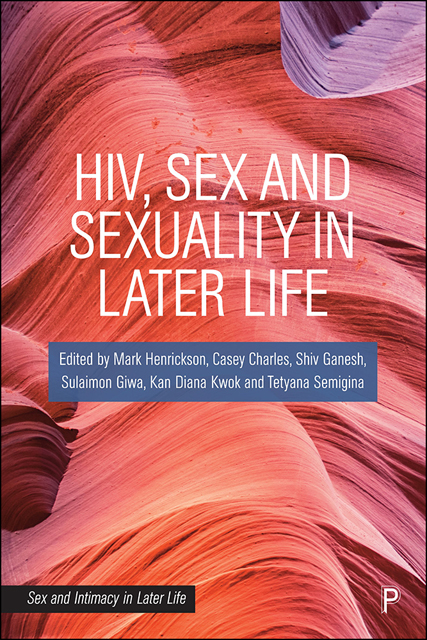2 - Beyond the biomedical: HIV as a barrier to intimacy for older women living with HIV in the United Kingdom
Published online by Cambridge University Press: 16 June 2023
Summary
Introduction
‘I said I just couldn’t [have a relationship], I just, I just don’t feel like I could. I’d feel, it’s that stigma thing. I’d feel like they would automatically assume that I was a promiscuous woman, and I would just wanna die, so I thought I’d rather do without really.’ (Woman living with HIV, aged 70– 80, participating in a workshop in London)
HIV has changed. Thanks to extraordinary advances in treatment, people living with HIV who are diagnosed promptly and have access to treatment and care have a near normal life expectancy and can expect the impact of the virus on their daily lives to be limited (May et al, 2014). Consequently, increasing numbers of people are ageing with HIV, leading to new experiences, both positive and negative, around growing older with HIV. Advances in treatment are symbiotically linked with advances in prevention, as it is now established that people on effective HIV treatment with undetectable viral loads cannot transmit the virus, a principle known as undetectable = untransmittable, or U= U (UNAIDS, 2018).
HIV has not changed. Social attitudes to HIV are not keeping pace with clinical progress (National AIDS Trust and Fast-Track Cities London, 2021), and though many attitudes are more informed and less stigmatising, stigma and discrimination persist and talking about HIV can have negative consequences (Public Health England, 2020). Knowledge of advances in HIV treatment and prevention is limited, particularly in communities where risk of HIV is low and limited priority is given to informing people about HIV (National AIDS Trust and Fast-Track Cities London, 2021).
HIV is complicated. To live with HIV is to live with a long-term condition that is manageable with treatment, and with a diagnosis that may have been delivered with a terminal prognosis. It is an identity and marker of community belonging, and a stigmatised condition that potentially opens up the risk of discrimination, judgment or worse. The quote that opens this chapter is from a woman in her seventies, diagnosed with HIV less than five years before she spoke these words in a workshop conducted for this research. She had not interacted socially with other women living with HIV prior to this workshop.
- Type
- Chapter
- Information
- HIV, Sex and Sexuality in Later Life , pp. 28 - 45Publisher: Bristol University PressPrint publication year: 2022

